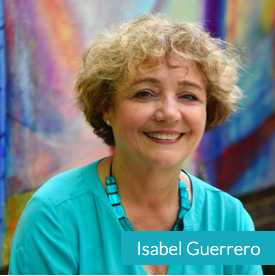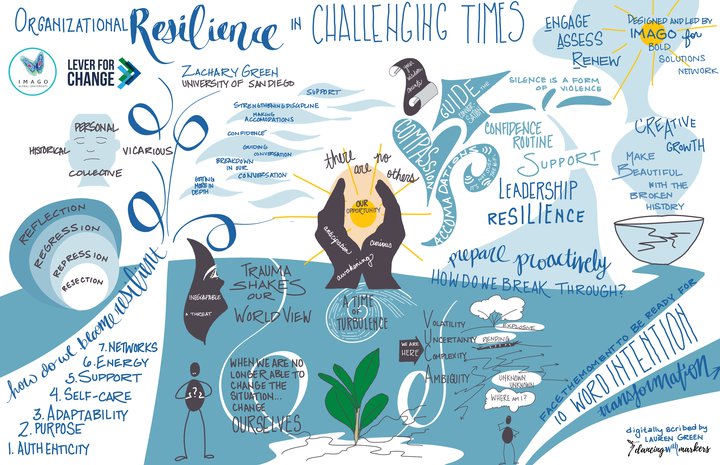
At times it seems we are in 1918, the year of the Spanish Flu. Sometimes it seems like 1929, the year of the economic crash and the beginning of the Great Depression. Oftentimes, it feels like we are in 1945, with so much conflict around us. And then suddenly we feel like we are in 1968, the year of massive demonstrations calling for change across the world. This series of shocks is unprecedented and very challenging.
The extraordinary moment we are living in requires us to build new ways of seeing the world and calls for developing resilience within ourselves, in our communities, and in our organizations.
Lever for Change invited our team at IMAGO Global Grassroots to work with organizations from the Bold Solutions Network, offering a series of online webinars, workshops, and organizational coaching focused on building resilience at both the personal and the organizational levels.
The presentation as well as the recording of the webinar (part one, part two; edited to ensure confidentiality of the interventions by live participants) are available online for all members of the Bold Solutions Network.
IMAGO provided a framework to understand resilience. We started by covering the definitions of resilience from several professional disciplines – engineering, ecology, psychology, poverty reduction, and an overall systems framework. We landed on the description of the Resilience Continuum and the different responses that are called for, depending on the extent and depth of the shock.
“Hallelujah, anyhow…no matter what you do to us, you won’t steal our joy…There is a resilience in this community, a well that had to be dug so deep. We know how to hold each other and carry through.”
Van Jones, reflecting on George Floyd’s funeral
A common theme that emerged from our conversations with the most promising NGOs around the world is that we need a more localized economy with shared power and a sense of future, where community members are at the heart of the work with the power to make decisions that affect them. At the organizational level, we need the courage to confront threats and take responsibility for our future, make space for difficult conversations, and work with teams to learn and adapt.
As we helped teams prepare to take and apply the work to their own organizations, we discussed the importance of leadership resilience in a volatile, uncertain, complex, and ambiguous world. We provided a lens through which to look at the characteristics of organizational trauma, helped identify current trauma, and equipped them with tools to respond to these challenges. We also reviewed resilience factors and what organizational leaders can do to establish them, as well as the importance of creating meaning in adversity through a focus on post-traumatic growth. This work is summarized on the Organizational Resilience guide developed through our work with BSN organizations.

IMAGO held two webinars, which included 24 Bold Solutions Network members, followed by a hands-on workshop for a smaller number of organizations that wanted to take the work further. This experience was designed to help teams plan how to implement the resilience interventions in their respective workspace. In this process we learned that:
- We are not alone. Symptoms of trauma are common and shared across organizations and their members.
- To start our resilience journey, we need to create space for reflection for ourselves and for our teams.
- We need to be kind to ourselves. Focusing on resilience factors can allow us to better meet the greater leadership challenge of this moment.
- We need transformational leadership that displays compassion, makes accommodations, and guides difficult conversations.
- There is an immense growth opportunity. Owning our history by engaging, assessing, and renewing ourselves can lead us to organizational growth.
Convening with this incredible group of organizations was a unique opportunity to use the collective experience of trauma that we experience as individuals and organizations to find ways to build more resilient teams and communities. This shared experience of hardship provided us a sense of renewal, growth, and clarity to lead teams through tough conversations and to identify key action points for navigating tumultuous times while taking care of each other.
To lead conversations on resilience with your teams and communities, please review/access/check out this guide developed as a result of our meetings.